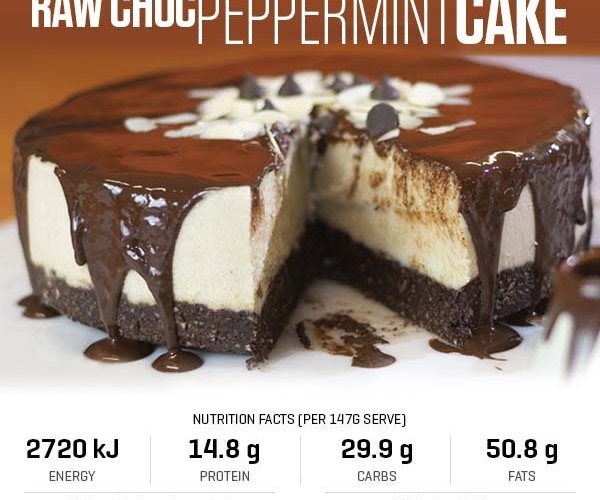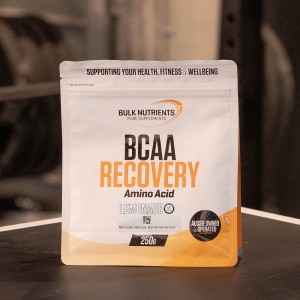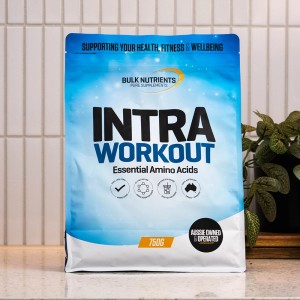How to Increase Protein Intake as a Vegan
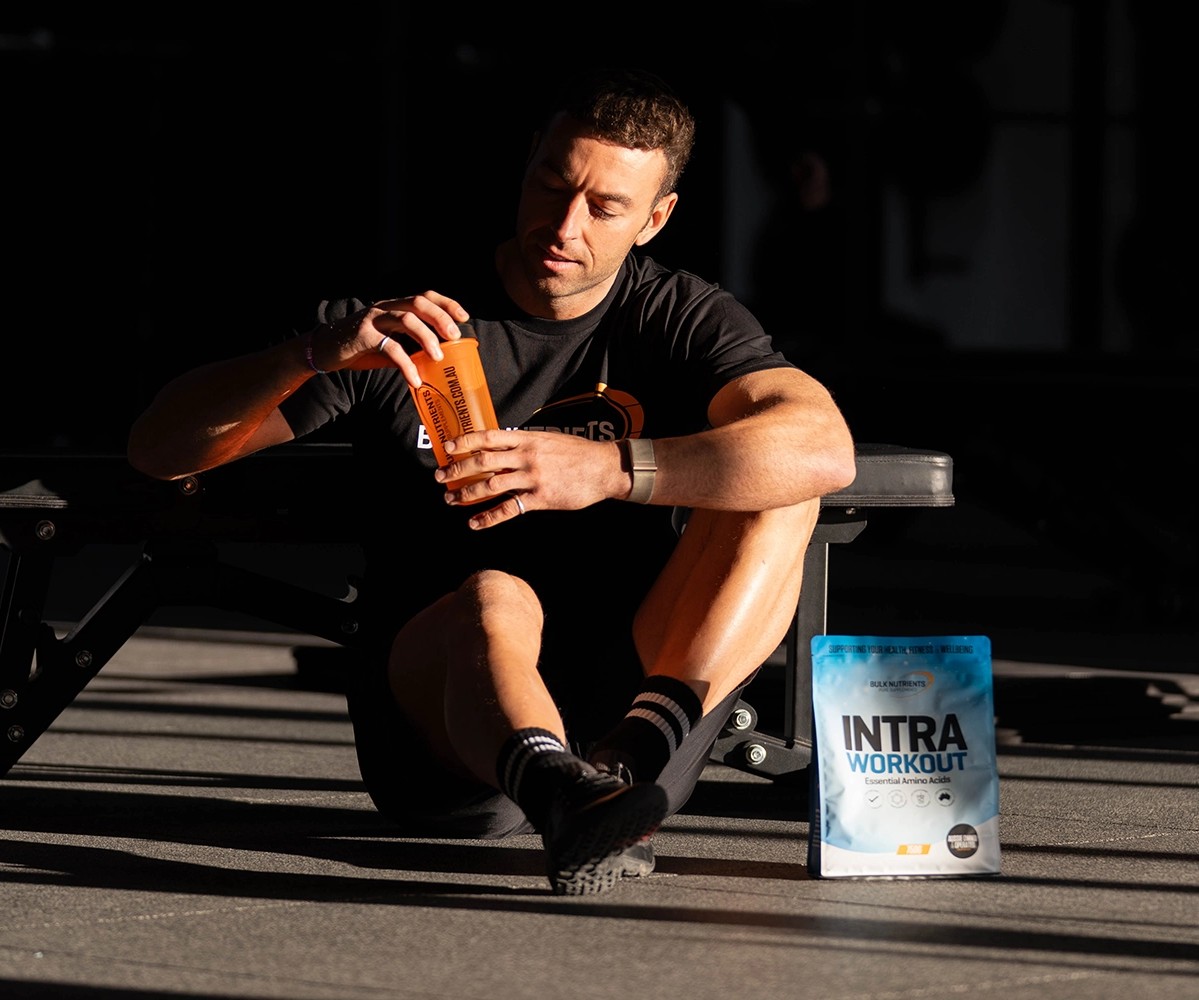
Why Vegans battle to get enough protein
Vegan or omnivore, you'll need 1.7 grams - 2.6 grams of protein per kilogram of body weight per day for optimal muscle growth.
Vegans tend to struggle to consume enough protein because plant-based foods are simply lower in protein when compared to an omnivorous diet. Making it even harder is the fact that vegans consume less energy than their omnivore friends, so the chances of getting more protein obviously decreases.
Vegans mustn't focus just on the amount of protein they get, but the quality of it to recover and grow from resistance training and exercise. Moreover, with protein being important for satiety and thus fat loss, it's critical to have a solid plan in place.
Another hurdle for vegans to overcome is that plant-based protein sources are often incomplete; an incomplete source of protein does not contain all essential amino acids. A complete protein source (found significantly more in an omnivorous diet) contains all nine essential amino acids in the right proportion to build protein in the body. We're talking about foods like beef, chicken and fish, for example.
And the key point is this: one of the vital amino acids that vegans can miss out on is leucine, one of three branched-chain amino acids (BCAAs).

Getting enough leucine in your diet: How to grow muscle as a vegan
You might have heard people claiming that's it's harder to build muscle as a vegan. Whilst this is a challenge because of leucine, it can be overcome. Leucine is so important because it's what triggers muscle growth and helps us recover and adapt from exercise. Think of it as one of the critical keys that unlock the muscle growth door when you've finished training!
Omnivores have the luxury of simply eating their required protein numbers and thus getting enough leucine as a result. But for vegans, it's much harder than that, and they tend to be advised to eat even more protein than is recommended to ensure they get enough leucine.
So how much leucine do vegans need? Well, for anyone that doesn't exercise, the daily dosage of leucine is about 40-45 mg per kilogram of body weight per day, which works out to be about 3.6 grams of leucine daily for someone who weighs 80 kilograms. And for those of us who exercise, precise dosages are yet to be declared, so we'll stick to the higher end to be safe. Foods high in protein and leucine: Growing muscle on a vegan diet
The first strategy for vegans to ensure they eat enough protein and thus leucine is by eating foods high in both. Here are some examples below:
| Food | Protein per 100g |
|---|---|
| Pumpkin seeds (dried, uncooked) | 30.2 |
| Lentils (red, split, uncooked) | 24.6 |
| Black beans (uncooked) | 21.6 |
| Almonds (raw) | 21.2 |
| Tempeh | 20.3 |
| Tofu (calcium set) | 17.3 |
| Oats (rolled) | 16.9 |
| Quinoa (uncooked) | 14.1 |
Table adapted from Rogerson, 2017.
Moreover, other foods like peas, potatoes, peanuts, walnuts and pistachios will really help vegans reach adequate protein levels.
Vegan supplements: BCAAs for muscle growth
With our Bulk Nutrients BCAA Recovery obviously containing leucine, and a generous 5 grams a serve, it makes BCAAs a great supplement for vegan gym-goers. Moreover, a serving of our BCAAs contains 11 grams of protein.
BCAAs can be taken anywhere and at any time too, which makes them very convenient when we're on the go.
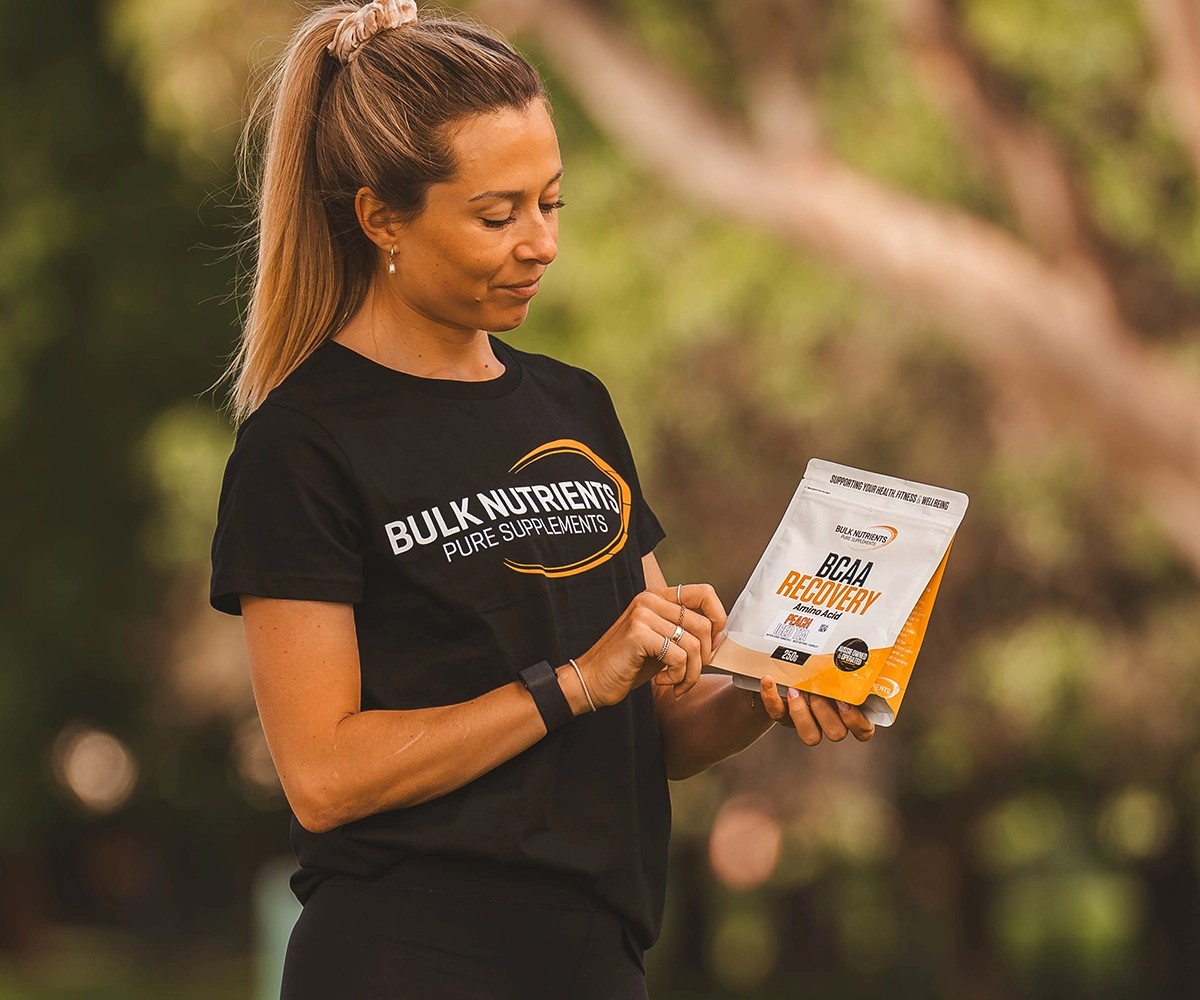
Vegan supplements: Bulk Nutrients Intra Workout for muscle growth
The third option for getting enough protein and leucine is by consuming our Intra Workout protein powder. intra Workout comes in great flavours like berry, cola, pineapple and lemonade, and contains 3.4 grams of leucine, including all essential amino acids -- and 21 grams of protein!
So now you know the foods and two critical supplements that can help vegans get enough protein and leucine, but how can we go about putting all that together?
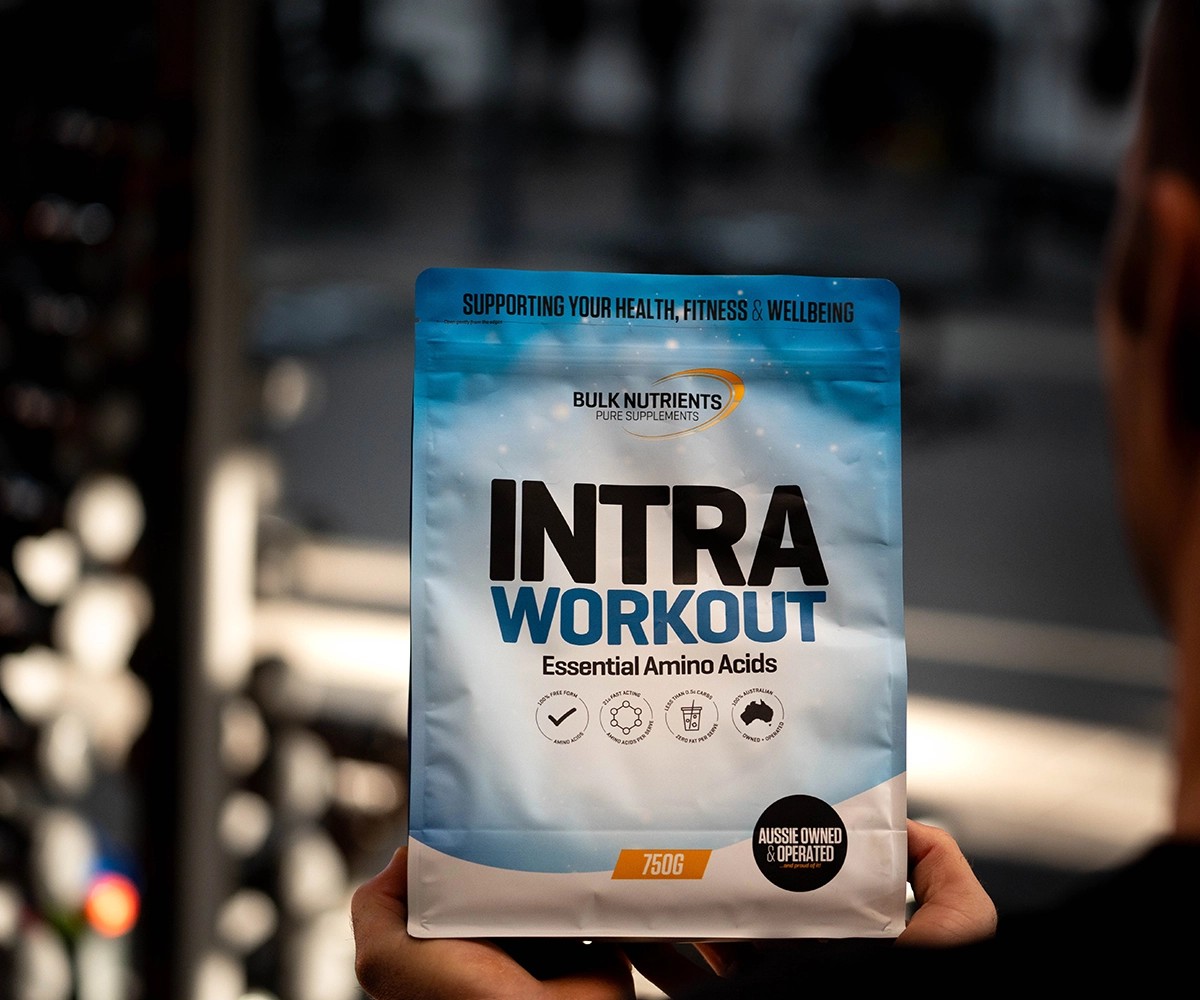
Muscle building diet plan for Vegan fitness fanatics and bodybuilders
Here is a sample day of how vegans can get adequate levels of protein and leucine, using the hypothetical example of Bulk Nutrients customer "Christina" who weighs 65 kilograms and is looking to gain muscle mass.
Christina burns 1800 calories a day and therefore needs to eat in a 20% calorie surplus for muscle growth: 2160 calories. Broken down into macronutrients, Christina would need to eat the following:
- Protein: 167 grams (668 calories).
- Fat: 50 grams (450 calories)
- Carbohydrates: 260 grams (1040 calories)
Leucine requirements = not declared by science for those looking to gain muscle at this stage, but let's aim for 7 grams to be safe!
Total: 2158 calories.
Breakfast:
1 serving of Bulk Nutrients Intra Workout
3 slices of bread (white or brown) with a 40 g serving of strawberry jam
Protein = 28 grams, Fat = 8 grams, carbohydrates = 80 grams (Leucine: 3.4 grams)
Lunch:
200 grams of tempeh
100 grams of cooked lentils
2 cups of spinach
Protein = 49 grams, Fat = 10 grams, carbohydrates = 42 grams (Leucine: 2.1 grams)
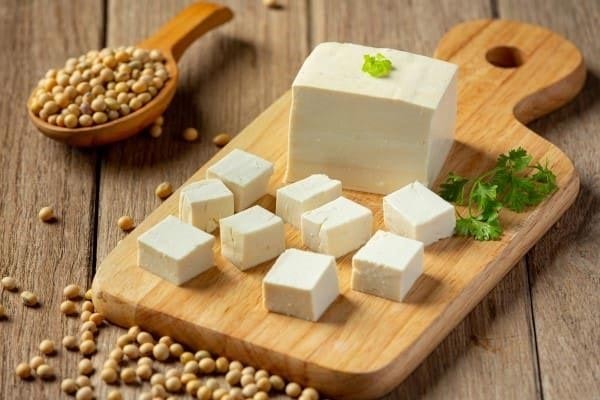
Dinner:
200 grams of Tofu (calcium set)
2 cups of quinoa (cooked)
1 cup of broccoli
Protein = 50 grams, Fat = 17 grams, carbohydrates = 89 grams (Leucine: 3.1 grams)
Before bed snack:
5 pikelets
22 grams of peanut butter
1 and a half servings of Bulk Nutrients Intra Workout
Protein = 35 grams, Fat = 15 grams, carbohydrates = 50 grams (Leucine: 5 grams)
GRAND TOTAL: Protein = 162 grams, Fat = 50 grams, carbohydrates = 261 grams (Leucine: 13.6 grams)
You can see how Christina has been able to get adequate protein, and leucine, utilising Bulk Nutrients supplements and good quality foods.
But of course, this is the perfect scenario where Christina has had time to prepare and plan foods. But when this isn't the case, Christina can rely more on her BCAAs and Intra Workout to reach adequate leucine and protein numbers. The reality is that a BCAA and protein supplement can generally guarantee with ease that vegans will achieve adequate levels of protein and leucine when life gets busy.
The bottom line is that with enough planning and supplements, vegans can still reach sufficient nutritional requirements to grow muscle at the same rate as their omnivore friends!
References:
- Appleby PN, Key TJ. The long-term health of vegetarians and vegans. Proc Nutr Soc. 2016 Aug;75(3):287-93. doi: 10.1017/S0029665115004334. Epub 2015 Dec 28. PMID: 26707634
- Campbell B, Kreider RB, Ziegenfuss T, La Bounty P, Roberts M, Burke D, et al. International Society of Sports Nutrition position stand: protein and exercise. J Int Soc Sports Nutr. 2007;4:8. doi: 10.1186/1550-2783-4-8.
- Campbell B, Kreider RB, Ziegenfuss T, La Bounty P, Roberts M, Burke D, et al. International Society of Sports Nutrition position stand: protein and exercise. J Int Soc Sports Nutr. 2007;4:8. doi: 10.1186/1550-2783-4-8.
- Clarys P, Deliens T, Huybrechts I, Deriemaeker P, Vanaelst B, De Keyzer W, Hebbelinck M, Mullie P. Comparison of nutritional quality of the vegan, vegetarian, semi-vegetarian, pesco-vegetarian and omnivorous diet. Nutrients. 2014 Mar 24;6(3):1318-32. doi: 10.3390/nu6031318. PMID: 24667136; PMCID: PMC3967195.
- Górska-Warsewicz H, Laskowski W, Kulykovets O, Kudlińska-Chylak A, Czeczotko M, Rejman K. Food Products as Sources of Protein and Amino Acids-The Case of Poland. Nutrients. 2018;10(12):1977. Published 2018 Dec 13. doi:10.3390/nu10121977
- Iraki J, Fitschen P, Espinar S, Helms E. Nutrition Recommendations for Bodybuilders in the Off-Season: A Narrative Review. Sports (Basel). 2019 Jun 26;7(7):154. doi: 10.3390/sports7070154. PMID: 31247944; PMCID: PMC6680710.
- McArdle WD, Katch FI, Katch VL. Exercise physiology: Energy, Nutrition, and Human Performance. 5th ed. Philadelphia PA: Lippincott Williams and Wilkins; 2001. Vitamins, minerals, and water; pp. 47–81.
- Mero A. Leucine supplementation and intensive training. Sports Med. 1999 Jun;27(6):347-58. doi: 10.2165/00007256-199927060-00001. PMID: 10418071.
- Phillips F. Vegetarian nutrition. Nutr Bull. 2005;30(2):132–167. doi: 10.1111/j.1467-3010.2005.00467.x.
- Phillips SM. The impact of protein quality on the promotion of resistance exercise- induced changes in muscle mass. Nutr Metab. 2016;13(1)
- Rogerson D. Vegan diets: practical advice for athletes and exercisers. J Int Soc Sports Nutr. 2017;14:36. Published 2017 Sep 13. doi:10.1186/s12970-017-0192-9
- Slater G, Phillips SM. Nutrition guidelines for strength sports: Sprinting, weightlifting, throwing events, and bodybuilding. J Sports Sci [Internet]. 2011 Jan 9 [cited 2019 Jun 24];29(sup1): S67–77. Available from: https://www.tandfonline.com/doi/full/10.1080/02640414.2011.574722
- Tipton KD, Wolfe RR. Protein and amino acids for athletes. J Sports Sci. 2004;22(1):65–79. doi: 10.1080/0264041031000140554.
- van Vliet S, Burd NA, van Loon LJ. The Skeletal Muscle Anabolic Response to Plant- versus Animal-Based Protein Consumption. J Nutr. 2015 Sep;145(9):1981-91. doi: 10.3945/jn.114.204305. Epub 2015 Jul 29. PMID: 26224750.
- Venderley AM, Campbell WW. Vegetarian diets : nutritional considerations for athletes. Sports Med. 2006;36(4):293-305. doi: 10.2165/00007256-200636040-00002. PMID: 16573356.
Westerterp-Plantenga MS, Lemmens SG, Westerterp KR. Dietary protein - its role in satiety, energetics, weight loss and health. Br J Nutr. 2012 Aug;108 Suppl 2:S105-12. doi: 10.1017/S0007114512002589. PMID: 23107521.
